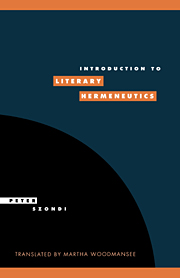Book contents
- Frontmatter
- Contents
- Foreword by Joel Weinsheimer
- Translator's preface
- Chapter 1 Introduction
- Chapter 2 Chladenius, I
- Chapter 3 Chladenius, II
- Chapter 4 Chladenius, III
- Chapter 5 Chladenius, IV
- Chapter 6 Meier, I
- Chapter 7 Meier, II
- Chapter 8 Ast
- Chapter 9 Schleiermacher, I
- Chapter 10 Schleiermacher, II
- Afterword by Jean Bollack
- Index
Chapter 3 - Chladenius, II
Published online by Cambridge University Press: 14 December 2009
- Frontmatter
- Contents
- Foreword by Joel Weinsheimer
- Translator's preface
- Chapter 1 Introduction
- Chapter 2 Chladenius, I
- Chapter 3 Chladenius, II
- Chapter 4 Chladenius, III
- Chapter 5 Chladenius, IV
- Chapter 6 Meier, I
- Chapter 7 Meier, II
- Chapter 8 Ast
- Chapter 9 Schleiermacher, I
- Chapter 10 Schleiermacher, II
- Afterword by Jean Bollack
- Index
Summary
The word “rational” points to the limitations of the hermeneutica profana: it is merely a prolegomenon to the hermeneutica sacra. The word “correct”, on the other hand, refers to the type of application Chladenius intends for his hermeneutics. Both his definition of understanding [Verstehen] – the raison d'être of interpretation – and his definition of obscurity – the sole field of action for the hermeneuticist – are limited in a way that must be questioned by contemporary hermeneutics. In the first instance, obscurity is hardly the only occasion for interpretation. Secondly, we must ask whether interpretation should deal only with that type of obscurity that arises from the reader's ignorance of certain information presupposed by a passage, while other types of obscurity either are to be clarified by the critic or the grammarian or are altogether impervious to clarification “by any properly grounded means.” It remains to be seen to what extent we are dealing with questions that were already being answered in a fundamentally different way at the end of the eighteenth century – I am thinking, for instance, of the restriction of hermeneutics to “correct” interpretation – and to what extent these are questions which still pose a challenge to literary hermeneutics today.
To assess the originality of Chladenius' theory of interpretation and its significance in the history of hermeneutics, we must familiarize ourselves with the basic concepts and ideas that give content to the structure of meaning and the criteria and methods for interpreting meaning.
- Type
- Chapter
- Information
- Introduction to Literary Hermeneutics , pp. 27 - 39Publisher: Cambridge University PressPrint publication year: 1995

